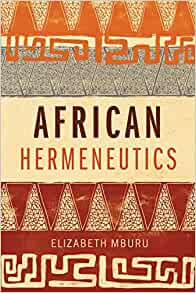A book with the word ‘hermeneutics’ in the title may not immediately attract attention from most Christian readers! The words ‘African hermeneutics’ might attract even less among readers in the UK or other ‘Western’ contexts. Many Christian readers today, however, are not in ‘the West’ but live in the ‘Majority World’ (Africa, Latin America, Asia). In these regions, many people have come to put their trust in Jesus as Lord. But they also need guidance on how to read the Bible carefully.
That is why Elizabeth Mburu has written her book. Mburu is a specialist in New Testament studies and is an editor of, and contributor to, the forthcoming revision of the Africa Bible Commentary. She also works with Langham Publishing. Her book discusses which principles and methods we should use to interpret the Bible carefully and accurately. That is what ‘hermeneutics’ refers to. She also writes as an African (a Kenyan, specifically) who recognises that everyone reads the Bible in a particular context, with particular questions that arise when reading the Bible, and she wishes to help African Christians to read the Bible in a way that is both meaningful and valid. That is why her book is entitled 'African Hermeneutics'.
Much of the book is a clear guide to understanding the different kinds of literature and language in the Bible. Any Bible reader, regardless of their location or cultural heritage, will benefit from Mburu’s explanations of how to interpret, for example, stories or wisdom literature. She writes without using much technical language and readers do not require to know biblical languages to follow her argument (unfortunately, the characters in the few Hebrew words printed in the footnotes have been incorrectly reversed).
Mburu recognises, however, that African Bible readers will be helped to see meaning and significance in the biblical texts if they can make connections between their own culture and the world of the biblical texts. For this reason, she devotes attention to the general worldview of Africans. (She recognises that not all Africans—coming from different peoples and places—hold exactly the same views, but she suggests that there is a substantial measure of consistency.) Mburu discusses the African worldview not so that it can dominate biblical interpretation but so that it can inform the process of understanding the text and so that it can be challenged by the biblical worldview.
Dr Mburu recently give an online presentation to the postgraduate seminar of Edinburgh Theological Seminary. We were glad to learn from our African Christian sister and I hope that this process of learning from Christian brothers and sisters in different parts of the world will become more natural, particularly as we rely more on video communication.
African Christians should read this book, written by a gifted African scholar, which will help them to read the biblical texts faithfully and carefully in their African context. Christians from other parts of the world should also read this book, partly so that they can learn good principles for reading the Bible and partly so that they can enter more fully into the experience of their African brothers and sisters.
This book is available to purchase from Langham Publishing.
Alistair I. Wilson, Edinburgh Theological Seminary

